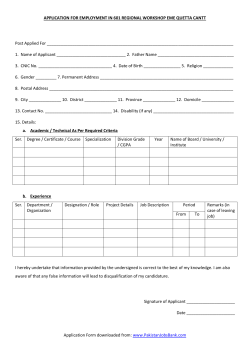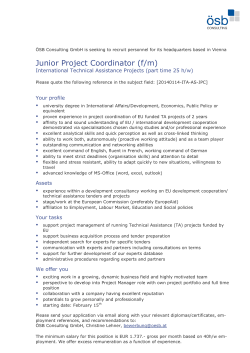
Peer review approach to support mutual learning in EU
EuropeAid/131004/C/SER/RSCR - European Union Programme for Central Asia EuropeAid/131004/C/SER/RSCR - European Union Programme for Central Asia Peer review approach to support mutual learning in EUCentral Asian dialogue on education Claudio Dondi, CAEP Team Istanbul, 16th-17th March 2015 www.gopa.de EuropeAid/131004/C/SER/RSCR - European Union Programme for Central Asia Peer review as a quality enhancement practice • • • • • To review articles to be published To review reports to be delivered To test innovation ideas To review institutional practices To review public policies EuropeAid/131004/C/SER/RSCR - European Union Programme for Central Asia Who is a peer? A person with similar competence (normally in a different context) In our case: • People involved in policy making in Higher Education and VET • Institutional managers in HEI and VET provider organisations from both central Asia and the EU, being directly committed in innovation and quality development processes EuropeAid/131004/C/SER/RSCR - European Union Programme for Central Asia Peer review for mutual learning: the CAEP case • Reviewing existing “good practices” in CA and EU as part of a learning process • LEARNING BY BEING REVIEWED: receiving feed-back and suggestions by peers, but also preparing documentation prior to the review (internal Q.A.) • LEARNING BY REVIEWING existing practice: comparing processes, results and governance; analyzing the reasons for good results, detecting enhancing and inhibiting factors for success EuropeAid/131004/C/SER/RSCR - European Union Programme for Central Asia Peer review at the Policy level PEER REVIEW MAY BE USED TO SUPPORT POLICY DIALOGUE… BUT SEVERAL DIFFERENCES AMONG COUNTRIES MUST BE KEPT IN MIND, e.g.: • Geo-political identity of different countries • Institutional culture and specific policy context • Socio-economic conditions • Structural characteristics of education and training systems • Availability of resources • Differences in the process of general and sectorial policy making EuropeAid/131004/C/SER/RSCR - European Union Programme for Central Asia The core principles of a meaningful peer review in terms of learning value • Identifying success factors • Distinguishing between those success factors that are “exportable” and those that are linked to specific contextual factors • Keeping an open mind for further improvement • Documenting the whole process EuropeAid/131004/C/SER/RSCR - European Union Programme for Central Asia What we need to define • Objectives and operational principles of Mutual Learning • Participants categories and collaboration dynamics • Study visits and virtual collaboration • Expected results and progress reporting • Support and integration mechanisms • Formative evaluation • Logistics and timing • Other feasibility considerations EuropeAid/131004/C/SER/RSCR - European Union Programme for Central Asia Thank You Contact: claudiodondi58@gmail.com
© Copyright 2025









